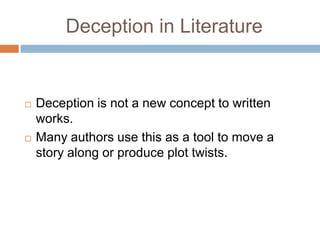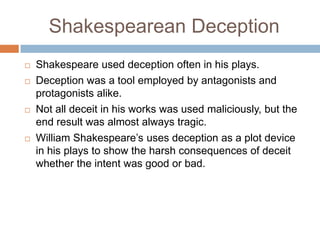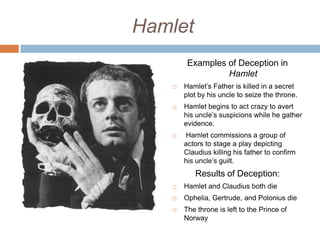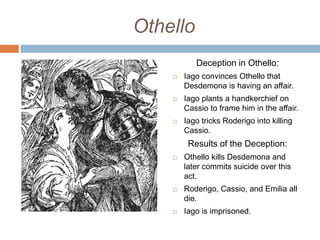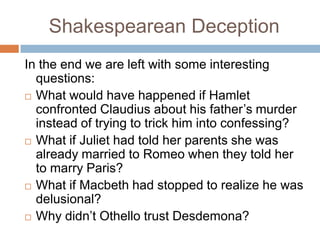Deception
- 1. DECEPTION IN THE WORKS OF WILLIAM SHAKESPEARE
- 2. What is deception today? ïĻ Omitting information to make something seem better than it is? ïĻ A little white lie? ïĻ Misrepresenting information to get ahead at work? ïĻ Telling your wife that the dress doesnât make her look fat?
- 3. Deception in Literature ïĻ Deception is not a new concept to written works. ïĻ Many authors use this as a tool to move a story along or produce plot twists.
- 4. Shakespearean Deception ïĻ Shakespeare used deception often in his plays. ïĻ Deception was a tool employed by antagonists and protagonists alike. ïĻ Not all deceit in his works was used maliciously, but the end result was almost always tragic. ïĻ William Shakespeareâs uses deception as a plot device in his plays to show the harsh consequences of deceit whether the intent was good or bad.
- 5. Contents To illustrate my point, we will discuss the following plays: ïĻ Hamlet ïĻ Romeo and Juliet ïĻ Macbeth ïĻ Othello
- 6. Hamlet Examples of Deception in Hamlet ïĻ Hamletâs Father is killed in a secret plot by his uncle to seize the throne. ïĻ Hamlet begins to act crazy to avert his uncleâs suspicions while he gather evidence. ïĻ Hamlet commissions a group of actors to stage a play depicting Claudius killing his father to confirm his uncleâs guilt. Results of Deception: ïĻ Hamlet and Claudius both die ïĻ Ophelia, Gertrude, and Polonius die ïĻ The throne is left to the Prince of Norway
- 7. Romeo and Juliet Deception in Romeo and Juliet ïĻ Romeo and Juliet fall in love and court each other against the wishes of their families. ïĻ Romeo secretly weds Juliet. ïĻ Juliet fakes her death to avoid marrying Paris. Results of Deception: ïĻ Romeo arrives at the Julietâs tomb, sees his sleeping wife and kills himself, unaware of her plans. ïĻ Juliet awakens, sees Romeoâs dead body and kills herself as well. ïĻ Mercutio, Tybalt, and Paris all die. ïĻ On a lighter note, the families stop their feud.
- 8. Macbeth Deception in Macbeth: ïĻ Macbeth tricking himself into believing he can control fate when he is told he will become king. ïĻ Macbethâs delusion that no man could harm him. ïĻ Macbeth believing that the witches were on his side and not agents of fate Results of Deception: ïĻ Macbeth and Lady Macbeth both die. ïĻ Macbeth has everyone in Macduffâs castle killed, including his wife and children.
- 9. Othello Deception in Othello: ïĻ Iago convinces Othello that Desdemona is having an affair. ïĻ Iago plants a handkerchief on Cassio to frame him in the affair. ïĻ Iago tricks Roderigo into killing Cassio. Results of the Deception: ïĻ Othello kills Desdemona and later commits suicide over this act. ïĻ Roderigo, Cassio, and Emilia all die. ïĻ Iago is imprisoned.
- 10. Shakespearean Deception In the end we are left with some interesting questions: ïĻ What would have happened if Hamlet confronted Claudius about his fatherâs murder instead of trying to trick him into confessing? ïĻ What if Juliet had told her parents she was already married to Romeo when they told her to marry Paris? ïĻ What if Macbeth had stopped to realize he was delusional? ïĻ Why didnât Othello trust Desdemona?
- 11. Conclusion ïĻ Art imitates life. ïĻ Most of us lie to avoid the potentially harsh consequences of the truth. ïĻ These lies are often told without regard to other people. ïĻ Through his stories, Shakespeare shows us the harsh, sometimes unintended consequences that can come from lies. ïĻ Honesty is a virtue and should be cherished.



